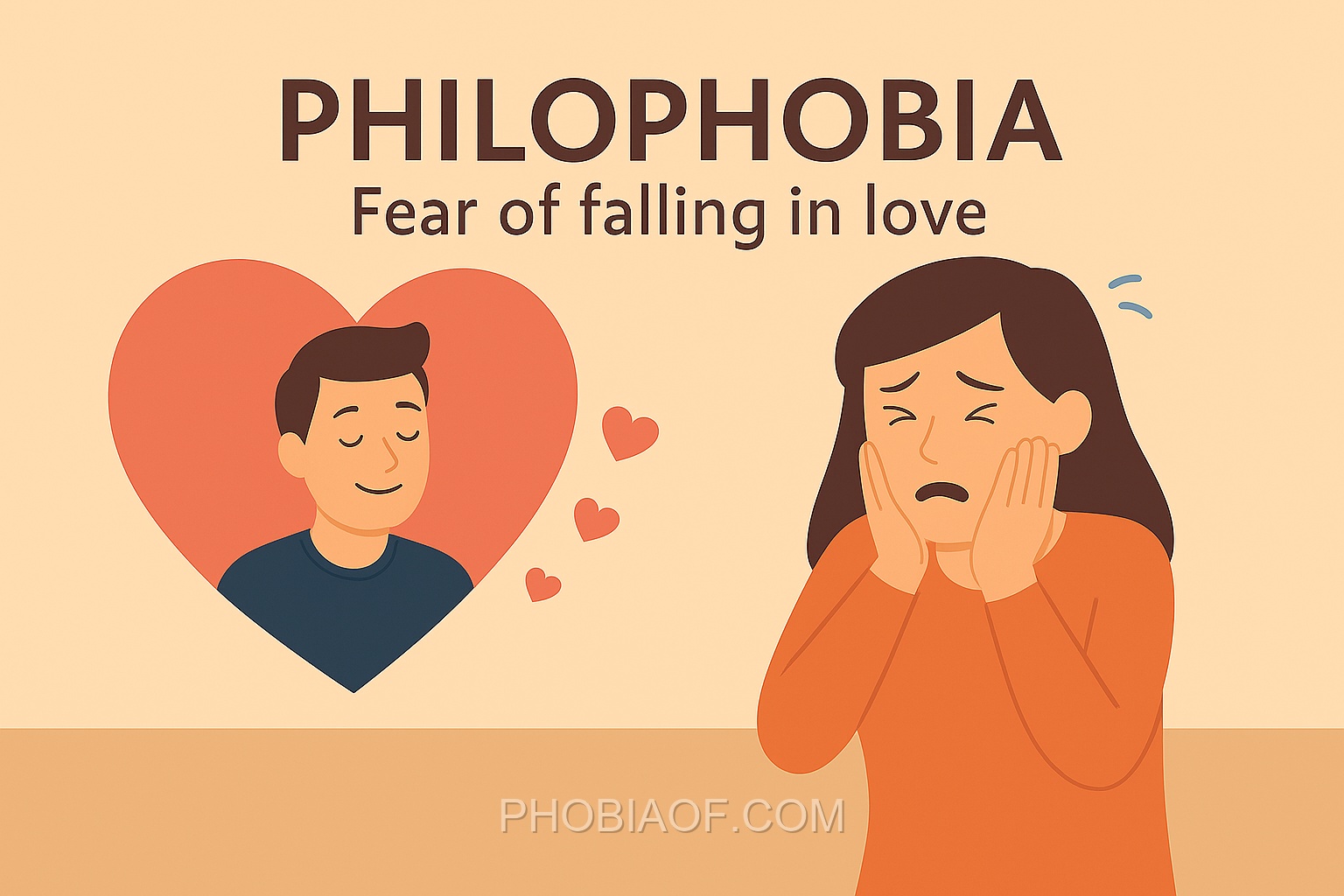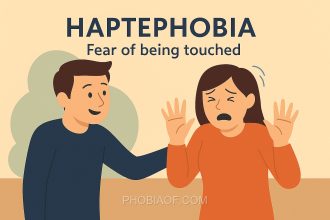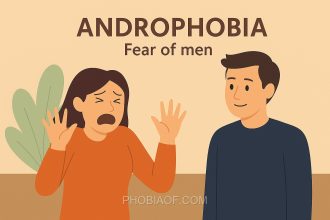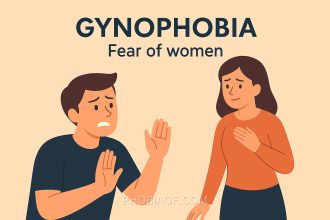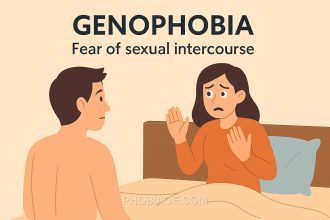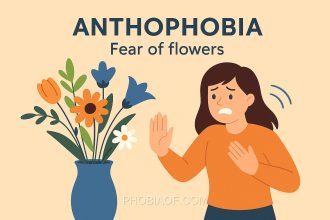Have you ever felt your heart race at the mere thought of falling in love, not out of excitement, but out of fear? This intense apprehension is what some people experience due to a condition known as Philophobia.
Philophobia is the overwhelming fear of falling in love or forming a deep emotional connection with another person. The term is derived from the Greek words “philos,” meaning loving or beloved, and “phobos,” meaning fear. It’s more than just a reluctance to date; it’s a profound dread that can significantly impact various aspects of a person’s life.
People with Philophobia may avoid relationships altogether, opting instead for solitude or superficial connections. This fear can stem from past traumatic experiences, cultural or familial pressures, or even seeing the negative outcomes of relationships around them. It can lead to feelings of isolation, anxiety, and even depression as individuals struggle between wanting connection and fearing its consequences.
Understanding Philophobia is crucial for those who experience it and for those who love them. By shedding light on this fear, we can foster compassion and support for individuals navigating the complexities of love and fear.
Causes of Philophobia
Philophobia, the fear of falling in love or forming emotional attachments, can stem from various causes. Understanding these can help in addressing the fear effectively. Below are some common reasons why someone might develop this phobia:
- Genetic Predisposition: Some individuals may have a genetic tendency towards anxiety-related disorders, which might include philophobia. While specific genes for philophobia haven’t been identified, a family history of phobias or anxiety can increase the likelihood of developing such fears.
- Traumatic Experiences: Past traumatic events, such as a painful breakup or the loss of a loved one, can contribute to the development of philophobia. These experiences can lead to an association between love and emotional pain, causing a person to avoid romantic relationships.
- Learned Behavior: Observing and internalizing the relationship dynamics of others can also influence one’s own fears. If someone grows up seeing dysfunctional or abusive relationships, they may learn to associate love with negative outcomes, leading to fear.
- Psychological Factors: Underlying mental health issues, such as depression or anxiety, can exacerbate fears of intimacy and vulnerability. These conditions might make it harder for someone to open up emotionally, reinforcing their fear of love.
- Environmental Factors: Cultural or societal norms that discourage emotional expression or prioritize independence can also play a role. In some cases, societal pressures or expectations can make the idea of love appear overwhelming or undesirable.
Researchers have also explored interesting theories regarding the origins of philophobia. Some suggest that it might be an evolutionary adaptive mechanism, where avoiding deep emotional attachments could have historically protected individuals from potential emotional pain and distraction from survival tasks.
Understanding these causes can help individuals and mental health professionals develop effective strategies to address and overcome philophobia, fostering healthier emotional connections.
Symptoms of Philophobia
Philophobia, the fear of falling in love or becoming emotionally attached, can evoke intense fear or anxiety in those affected. This phobia can manifest in various physical and emotional symptoms, making it challenging for individuals to navigate everyday situations and relationships. Recognizing these symptoms is the first step toward understanding and addressing the phobia.
Common Physical Symptoms:
- Panic attacks that may arise at the thought of love or emotional closeness.
- Excessive sweating, particularly in social or romantic situations.
- Rapid heartbeat when confronted with the prospect of intimacy.
- Shortness of breath or difficulty breathing in situations that trigger the phobia.
Emotional and Behavioral Symptoms:
- Avoidance of places, people, or activities that may lead to romantic encounters.
- Overwhelming dread at the thought of falling in love or forming deep attachments.
- Persistent worry about losing independence or being hurt emotionally.
- Refusal to engage in conversations about romantic relationships.
These symptoms can significantly interfere with daily life, preventing individuals from forming meaningful relationships and experiencing the joys of love and companionship, especially when the phobia is severe.
Treatment for Fear of Falling in Love
Philophobia, or the fear of falling in love, can be a challenging experience. However, it is important to remember that this phobia can be treated and managed over time. With the right approach, individuals can learn to embrace the idea of love and form meaningful relationships.
Here are some of the treatment options and coping strategies for overcoming Philophobia:
- Exposure Therapy: This therapy involves gradually facing the fear of love in a controlled and safe environment. By slowly exposing oneself to situations that trigger the fear, individuals can desensitize their emotional responses over time.
- Cognitive-Behavioral Therapy (CBT): CBT is designed to help individuals identify and change the fearful thoughts associated with falling in love. By challenging these thoughts and replacing them with healthier, more positive beliefs, individuals can reduce anxiety and fear.
- Counseling: Speaking with a counselor or therapist can provide a supportive space to explore the roots of Philophobia. Through guided discussions, individuals can gain insights into their fears and develop strategies to overcome them.
In addition to therapy, there are several self-help coping techniques that can complement the treatment process:
- Relaxation Exercises: Techniques such as deep breathing, progressive muscle relaxation, and guided imagery can help reduce anxiety and promote a sense of calm.
- Meditation: Regular meditation practice can increase mindfulness and help individuals manage their emotional responses to fear-triggering situations.
- Support Groups: Joining a support group can provide a sense of community and shared understanding. Discussing experiences with others facing similar challenges can be incredibly validating and empowering.
In some severe cases, medication such as anti-anxiety medications might be prescribed. However, it is important to focus on therapy and coping skills as the foundation for overcoming Philophobia.
If Philophobia is interfering with your life, it is crucial to seek professional help. With the right support and guidance, it is possible to overcome the fear of falling in love and build fulfilling relationships.
Remember, you are not alone in this journey, and help is available. Reach out to a mental health professional to explore your next steps.
Conclusion
Understanding the causes and symptoms of Philophobia, the fear of falling in love, is a significant step toward empowerment and healing. By recognizing the underlying factors and how they manifest, individuals can take proactive measures to address the phobia. This understanding not only provides clarity but also paves the way for seeking effective solutions.
It is important to remember that many people overcome or manage their phobias with time and the right support. With the proper help, such as therapy or professional guidance, individuals can work through their fears and open themselves to the possibility of forming healthy, fulfilling relationships. If you or someone you know is struggling with Philophobia, consider reaching out to a therapist or talking to a doctor for support. These professionals can provide valuable assistance and strategies to help navigate the complexities of this phobia.
In conclusion, while Philophobia can be challenging, it is not insurmountable. With awareness, understanding, and the willingness to seek help, individuals can find hope and healing. Embrace the journey toward overcoming your fears, knowing that you are not alone, and that support is available to guide you along the way.
